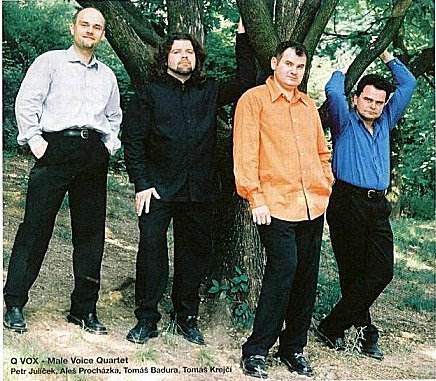Here’s
a coupling both logical and exploratory.
Křížkovský was a Moravian contemporary
of Smetana but one who lived most of
his life in the Augustinian monastery
in Brno. And when Janáček lectured
on mid-nineteenth century national music
he praised his fellow Moravian as a
pivotal figure. So it’s apposite that
Q VOX, the Brno-based male voice quartet,
chooses to collate the two not least
because, though
thirty-four years Křížkovský’s
junior, the earliest of Janáček’s
settings here date from 1878, only eighteen
years after the older man’s settings
presented in this disc.
Křížkovský’s
settings are full of delicacy and refinement
and they tap into the Moravian
folk soil with keenness; the press and
relaxation of the ballad Utonulá
is mirrored in the great purity
of Pastýř
a poutníci (a Marian text
not a folk song) where the consort singing
has considerable finesse. More ebullient
but still adhering to a mid nineteenth
century ethos Výpreak
points the way to the early Janáček
choruses, where one finds a similar
reserve, and it’s clear that the older
man’s influence was strong. It was actually
Janáček who replaced the Brno scion
as organist at the Church School
and we have some examples here of the
younger man’s (rare) liturgical music.
A setting such as Osudu
neujdeš adheres quite closely to
formal models and the earlier settings,
though they may have been revised (Osamělá
bez těchy for example
was written in 1898 but revised in 1925)
still bear the imprint of newly established
norms in Moravian folk setting. Even
the noble simplicity of the liturgical
Veni sancta and Ave Maria
bring
to mind Křížkovský’s Pastýř
a poutníci. It’s not really
until Tři
mužské
sbory (Three Male Choirs,
1888) and the later Pět
národních písní (Five
Folk Songs, 1912) that one feels a truly
characteristic Janáček voice. The
teeming voices in the last of the Three
Male Choirs for instance with its inimitable
cadences. Demands on the technique increase
in the 1912 setting where the tenor
is pushed very high and the overlapping
lines create a dizzying complexity in
the opening ballad. Here, whilst predominately
slow, Janáček gives the opening
lines to a low voice that is then joined
by the others. He also writes
for a harmonium, which is most apparent
in the last of the set of five, A
byl jeden zeman (And there was once
a farmer) with its appositely rustic
oompah accompaniment.
Q VOX (all capitals
apparently) and their associates evoke
these textures with great skill and
tonal blend. They may be rather scary
looking Moravians (the booklet picture
scared the life out of me; they’re scarier
looking than Wagnerian mezzos) but their
accomplishment is palpable. Not all
top-drawer Janáček,
it must be said, though what we have
is more than useful in examining an
important strand of his compositional
development. But without question intriguing,
not least for the Křížkovský connection.
Jonathan Woolf


